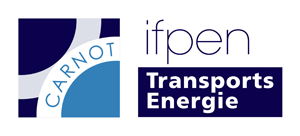 IC powertrains
IC powertrains
Our networks
Groupement Scientifique Energies et Mobilités (GSEM)
Created in 1980, the GSEM brings together IFPEN, Renault and Stellantis in a joint research effort on thermal engines. Over time, the partnership has adapted to evolving technologies and market needs.
“The GSEM conducts preliminary research:
• (evaluation of concepts, identification of technologies with potential)
• but can also provide support for field-specific issues (customer feedback analysis)
• or the introduction of software tools and design methodologies.
We contribute our expertise and research facilities to the group. The GSEM’s research activities are aimed at improving air quality by reducing the fuel consumption and CO2 emissions of IC powertrains. Over the past two years, research has primarily focused on gasoline technologies for integration into an electric powertrain. Work is also under way to identify future generations of energy converters most suited to changes in the energy sector beyond 2030. One of the GSEM’s strengths is that it moves with the times.” Benjamin Réveillé, GSEM Project Manager, IFPEN
H2020 LongRun project: more environmentally-friendly heavy trucks and coaches
The LongRun “Development of efficient and environmentally friendly LONG distance poweRtrain for heavy dUty trucks aNd coaches” project was launched in January 2020 as part of the European Horizon 2020 program. The project, which will last for three and a half years, is being conducted with 30 partners* across 13 countries. It aims to develop a complete set of powertrains for more environmentally-friendly heavy trucks and coaches.
As part of the Carnot IFPEN Transports Energie, IFPEN's teams are contributing their expertise in the design and characterization of combustion systems for low-CO2 fuels (gas, hydrogen, dual fuel, biofuels), as well as the development of connected eco-routing and eco-driving services to increase the reduction of energy consumption. LongRun will also help establish road maps relating to powertrain technology and future low-CO2 fuels, to inform the reflection processes of the European Commission and guide future R&D programs.
* the leading truck and coach equipment manufacturers, as well as their suppliers and research partners
This project received funding from the European Union’s H2020 research and innovation program through grant agreement 874972
H2020 PHOENICE project: a plug-in zero-emission hybrid vehicle
Coordinated by IFPEN and conducted with seven industrial and academic partners, the PHOENICE (PHev towards zerO EmissioNs & ultimate ICE efficiency) project, launched in 2021, is aimed at developing a plug-in hybrid vehicle demonstrator with reduced fuel consumption and pollutant emissions. IFPEN will primarily be responsible for the design of the combustion system based on the Swumble™ concept, the design of the after-treatment system, the creation of the engine prototypes and the calibration of the multi-cylinder engine.
PHOENICE will help accelerate the transition towards more environmentally-friendly mobility in terms of air quality and the reduction in greenhouse gas emissions. The project partners are: CRF/FCA (Fiat Group research center), FEV Europe, Johnson Matthey, Marelli Europe, Garrett Motion France, Politecnico di Torino and In Extenso Innovation Croissance.
This project received funding from the European Union’s H2020 research and innovation program through grant agreement 101006841
ANR Ofelie project: ANR Ofelie project: A deeper understanding of oxygenated fuels
Coordinated by IFPEN as part of the Carnot IFPEN Transports Energie, the ANR Ofelie project was launched in September 2021 for a three-year period. The project, which brings together car manufacturers (Stellantis and Renault) and research laboratories (PC2A, LRGP), should help complete the knowledge on the physicochemical phenomena related to the increasing use of oxygenated fuels
LowCarbfuels.dk project: Sustainable fuels for air and sea transport
Supported by a Danish research and innovation fund and involving more than ten European research centers and universities, this project seeks to promote the development of sustainable fuels through HTL (Hydrothermal Liquefaction). IFPEN is contributing to the definition of the fuel matrices to be studied, to the analysis of products resulting from the HTL process and to the testing of their compliance with certification standards in the aviation and maritime fields.
Hymot project: a demonstrator for a range of low-carbon commercial vehicles
The HyMot (hydrogen engine) project brings together eight industrial and academic partners, including Bosch (coordinator), Renault, Alpine Racing, Faurecia, OSE Engineering, Total, the École Centrale de Nantes and IFPEN through the Carnot IFPEN Transports Energie. The project aims to demonstrate the feasibility of decarbonizing a commercial vehicle by converting its internal combustion engine to hydrogen, as an alternative to electrification coupled with a hydrogen fuel cell. The Carnot IFPEN TE teams will bring their recently consolidated expertise in the field of hydrogen IC engines to design the combustion system.








